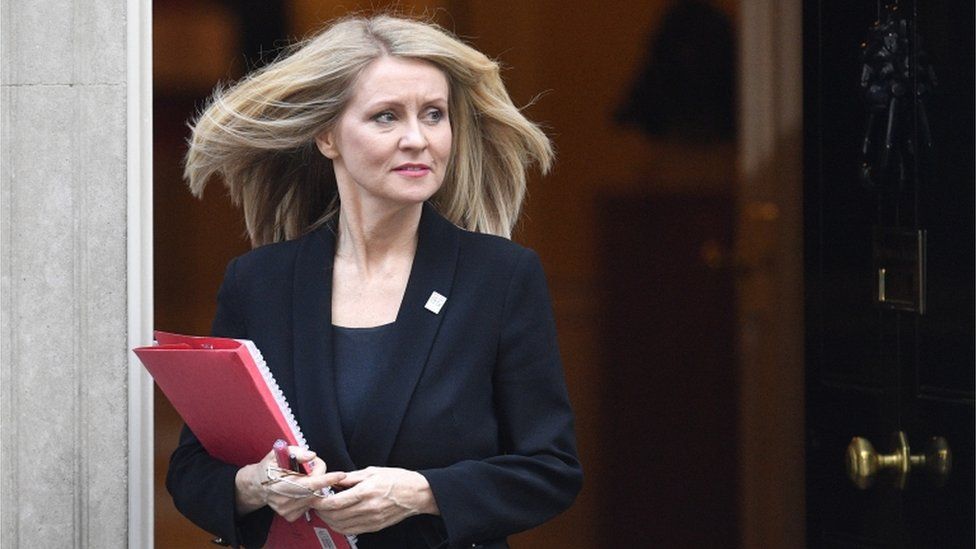Esther McVey announces Conservative leadership bid
- Published

Former cabinet minister Esther McVey has announced she will stand for leader of the Conservative Party.
She told Talk Radio she had "enough support" from fellow MPs to "go forward" once Theresa May stands down.
International Development Secretary Rory Stewart has announced he will run and Commons leader Andrea Leadsom has said she is "considering" doing so.
Other senior Tories are expected to join them, with Mrs May promising to go once the first stage of Brexit is over.
The widely touted possible contenders include former and current members of the Cabinet, including Boris Johnson, Michael Gove, Amber Rudd, Sajid Javid, Dominic Raab, Jeremy Hunt, Penny Mordaunt and Liz Truss.
Ms McVey, a Brexit supporter and former TV presenter, quit as Work and Pensions Secretary last November in protest at Mrs May's withdrawal agreement with the EU.
Asked on Talk Radio whether she would run for leader, the MP for Tatton, in Cheshire, said: "I've always said quite clearly that if I got enough support from colleagues then, yes, I would, and now people have come forward and I have that support."
In a Conservative leadership contest, MPs hold a series of ballots, with the candidate gaining the fewest votes eliminated at each stage.
Once the field is reduced to two, the winner is chosen by a vote of party members. This wider vote did not occur in 2016, when Mrs May became leader, after the second-placed candidate among MPs - Mrs Leadsom - stood aside.
Mrs May won a Tory MPs' vote of confidence in her leadership last December, and party rules mean that another such vote cannot be triggered until next December.
But the prime minister has come under pressure to name an exit date, after the Commons effectively rejected her agreement with the EU three times.
The Conservatives also lost more than 1,300 seats in last week's English council elections, increasing concerns over possible heavy losses to Nigel Farage's Brexit Party in European Parliament elections on 23 May.
Sir Graham Brady: "No public clarity" on Theresa May's departure date
Mrs May has agreed to address a meeting of the 1922 Committee - an elected body of Tory MPs which represents backbenchers and oversees leadership contests - next week.
The committee's chairman, Sir Graham Brady, said he believed she would ask the Commons to vote again on the terms of the UK's exit before the European Parliament elections.
Much of the anger in the Conservative parliamentary party is focusing on Mrs May's efforts to find a Brexit compromise with Labour.
And local Conservative Association chairmen are to hold a non-binding no-confidence vote on the prime minister's leadership.
In the Commons on Wednesday, Tory MP Andrea Jenkyns urged Mrs May to resign, saying she had "failed to deliver on her promises" on Brexit.
But Mrs May replied that this was "not an issue about me" and that, if it was up to her, the UK would have already left the EU.
Former Chancellor George Osborne has suggested the cabinet should move against the prime minister, so the Conservative Party can change leader and "win over supporters who have disappeared".
But Work and Pensions Secretary Amber Rudd said this would be "a mistake".
"We need to hold our nerve," she added. "[The prime minister] has said that she's going to leave after the first stage of Brexit is done.
"We are full tilt at trying to do the first stage and I think a leadership election now would be disruptive of a process that is taking so much of our energy right now."
Ministerial moves
Meanwhile, Mrs May has carried out a reshuffle of junior and middle-ranking ministerial roles.
Robert Buckland moves from being solicitor general to a minister of state at the Ministry of Justice.
Lucy Frazer is now solicitor general. having previously been a parliamentary under secretary of state at the Ministry of Justice.
Paul Maynard goes from being a government whip to replace Ms Frazer in the Ministry of Justice job.
And Andrew Murrison becomes a minister of state at the Foreign and Commonwealth Office.